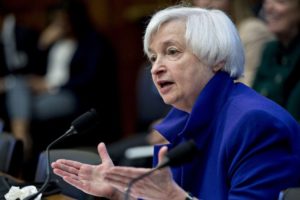 Federal Reserve Chair Janet Yellen said the U.S. economy faces no serious short-term obstacles, though it must deal with important long-term challenges of low productivity and growing inequality.
Federal Reserve Chair Janet Yellen said the U.S. economy faces no serious short-term obstacles, though it must deal with important long-term challenges of low productivity and growing inequality.
“Unemployment has now reached a low level, the labor market is generally strong and wage growth is beginning to pick up,” Yellen said Thursday in a meeting with educators. “Inflation has moved up from a very low level, and it’s a little bit under our 2 percent objective, but it’s pretty close.”
The Fed increased interest rates last month for the first time in a year, to a range of 0.5 percent to 0.75 percent, after judging that near-term risks to the outlook “appear roughly balanced.” Policy makers also indicated they expect to hike three times in 2017, according to the median estimate of their quarterly forecast.
Unemployment was 4.7 percent in December, a slight uptick from November when it reached 4.6 percent, its lowest level since 2007. The Fed’s preferred gauge of inflation, minus food and energy components, was 1.6 percent in the 12 months through November.
Yellen said productivity, a “key determinant” of living standards over the long term, remained at historically low levels and economists were struggling to understand why. Related to low productivity, she said a greater share of income gains were going to workers with higher education, causing inequality to rise in the U.S.
Education and workforce development have been frequent topics of discussion for Fed officials in recent years as technology continues to drive changes in the workplace. Yellen told graduating college students in Baltimore last month that career success will increasingly be linked to education.
Yellen on Thursday was speaking to teachers gathered in the board room at the Fed’s headquarters in Washington and, via web cast, to others through the country. She also touted reforms to banking regulation that followed the financial crisis aimed at making the financial sector safer and more resilient.
“These are very important changes,” Yellen said. “I certainly wouldn’t want to see them rolled back.”
Members of the incoming administration of President-elect Donald Trump have said they will seek to dismantle the 2010 Dodd-Frank Act, the principle legislative response to the crisis.





